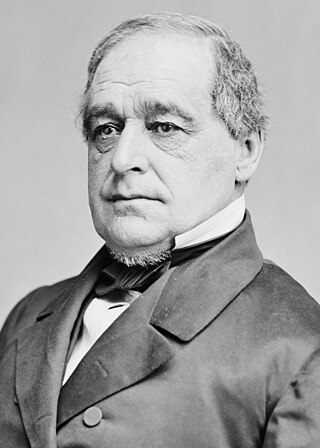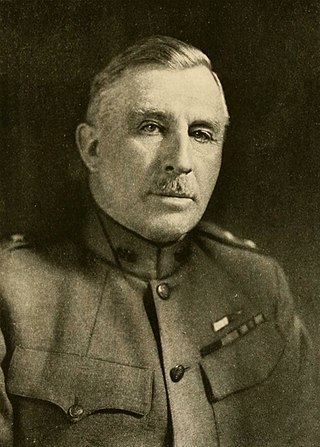Related Research Articles

Abraham Lincoln was an American lawyer, politician, and statesman who served as the 16th president of the United States from 1861 until his assassination in 1865. Lincoln led the Union through the American Civil War to defend the nation as a constitutional union and succeeded in abolishing slavery, bolstering the federal government, and modernizing the U.S. economy.

Hannibal Hamlin was an American attorney and politician who served as the 15th vice president of the United States from 1861 to 1865, during President Abraham Lincoln's first term. He was the first Republican vice president.

The Reconstruction era was a period in American history following the American Civil War (1861–1865) and lasting until approximately the Compromise of 1877. During Reconstruction, attempts were made to rebuild the country after the bloody Civil War, bring the former Confederate states back into the United States, and to counteract the political, social, and economic legacies of slavery.

Samuel Jones Tilden was an American politician who served as the 25th governor of New York and was the Democratic nominee in the disputed 1876 United States presidential election.

Salmon Portland Chase was an American politician and jurist who served as the sixth chief justice of the United States. He also served as the 23rd governor of Ohio, represented Ohio in the United States Senate, and served as the 25th United States Secretary of the Treasury. Chase is therefore one of the few American politicians who have served in all three branches of the federal government, in addition to serving in the highest state-level office.

Leonard Wood was a United States Army major general, physician, and public official. He served as the Chief of Staff of the United States Army, Military Governor of Cuba, and Governor-General of the Philippines. He began his military career as an army doctor on the frontier, where he received the Medal of Honor. During the Spanish–American War, he commanded the Rough Riders, with Theodore Roosevelt as his second-in-command. Wood was bypassed for a major command in World War I, but then became a prominent Republican Party leader and a leading candidate for the 1920 presidential nomination.

Carl Schurz was a German revolutionary and an American statesman, journalist, and reformer. He migrated to the United States after the German revolutions of 1848–1849 and became a prominent member of the new Republican Party. After serving as a Union general in the American Civil War, he helped found the short-lived Liberal Republican Party and became a prominent advocate of civil service reform. Schurz represented Missouri in the United States Senate and was the 13th United States Secretary of the Interior.

Noah Haynes Swayne was an American jurist and politician. He was the first Republican appointed as a justice to the United States Supreme Court.

Solomon Foot was an American politician and attorney. He held numerous offices during his career, including Speaker of the Vermont House of Representatives, State's Attorney for Rutland County, member of the United States House of Representatives, and United States Senator.

Jeremiah Haralson, was a politician from Alabama who served as a state legislator and was among the first ten African-American United States Congressmen. Born into slavery in Columbus, Georgia, Haralson became self-educated while enslaved in Selma, Alabama. He was a leader among freedmen after the American Civil War.

Frederick Holbrook was an American farmer, businessman, and Governor of the State of Vermont. Active in politics and government, first as a Whig, and later as a Republican, he was most notable for his service as the 27th governor of Vermont from 1861 to 1863.

This is a selected bibliography of the main scholarly books and articles of Reconstruction, the period after the American Civil War, 1863–1877.

Lincoln's "Lost Speech" was a speech given by Abraham Lincoln at the Bloomington Convention on May 29, 1856, in Bloomington, Illinois. Traditionally regarded as lost because it was so engaging that reporters neglected to take notes, the speech is believed to have been an impassioned condemnation of slavery.

Abraham Lincoln served as a volunteer in the Illinois Militia April 21, 1832 – July 10, 1832, during the Black Hawk War. Lincoln never saw combat during his tour but was elected captain of his first company. He was also present in the aftermath of two of the war's battles, where he helped to bury the militia dead. He was mustered in and out of service during the war, going from captain to private and finishing his service in an independent spy company commanded by Captain Jacob Early.

Abraham Jonas (born September 12, 1801, in Exeter, England; died June 8, 1864) was the first permanent Jewish resident in Quincy, Illinois. He was a member of the Illinois and Kentucky state legislatures, a leading lawyer, Freemason, and a valued friend of Abraham Lincoln.
This bibliography of William McKinley is a comprehensive list of written and published works about or by William McKinley, the 25th president of the United States.

The Caning of Charles Sumner, or the Brooks–Sumner Affair, occurred on May 22, 1856, in the United States Senate chamber, when Representative Preston Brooks, a pro-slavery Democrat from South Carolina, used a walking cane to attack Senator Charles Sumner, an abolitionist Republican from Massachusetts. The attack was in retaliation for a speech given by Sumner two days earlier in which he fiercely criticized slaveholders, including pro-slavery South Carolina Senator Andrew Butler, a relative of Brooks. The beating nearly killed Sumner and contributed significantly to the country's polarization over the issue of slavery. It has been considered symbolic of the "breakdown of reasoned discourse" and the use of violence that eventually led to the Civil War.

In the 1864 U.S. presidential election, the Democrats nominated Union Army General George McClellan for U.S. President and Ohio U.S. Representative George Pendleton for U.S. Vice President. During the campaign, McClellan vowed to do a better job of prosecuting the Union Army effort in the American Civil War than incumbent U.S. President Abraham Lincoln did. Ultimately, the McClellan-Pendleton ticket lost to the National Union ticket of Abraham Lincoln and former U.S. Senator Andrew Johnson.

Louis Frisbie Payn was an American manufacturer and politician from New York. A Republican, he was most prominent for serving as United States Marshal for the Southern District of New York from 1887 to 1881 and Superintendent of the New York State Insurance Department from 1897 to 1900.
James Henri Burch, often written as J. Henri Burch, was an African American state legislator in Louisiana during Reconstruction, the years after the Civil War. He represented East Baton Rouge Parish in both the state's House of Representatives and Senate and was an important Black political leader in the period.
References
- ↑ Clegg, Claude Andrew (21 March 2018). The Life and Times of Elijah Muhammad. UNC Press Books. ISBN 9781469618050 – via Google Books.
- ↑ Anderson, James D. (27 January 2010). "The Education of Blacks in the South, 1860–1935". Univ of North Carolina Press. p. 18 – via Google Books.
{{cite web}}: Missing or empty|url=(help) - ↑ Symonds, Craig L. (1 October 2010). Lincoln and His Admirals: Abraham Lincoln, the U.S. Navy, and the Civil War. Oxford University Press. ISBN 9780199751570 – via Google Books.
- ↑ Hayes Historical Journal, Volumes 6-7 Hayes Historical Society, 1986 pages 28 and 31
- ↑ Gates, Henry Louis (21 March 2018). 100 Amazing Facts about the Negro. Pantheon Books. ISBN 9780307908711 – via Google Books.
- ↑ "The Freemason's Chronicle". W.W. Morgan. 21 March 1885 – via Google Books.
- ↑ https://digitalcollections.nypl.org/items/510d47df-7b97-a3d9-e040-e00a18064a99 New York Public Library collection etched print of Costin as grand master of freemasons
- ↑ New York Times: Disunion: Modern Historians Revisit and Reconsider the Civil War from Lincoln's Election to the Emancipation Proclamation. 11 June 2013. ISBN 9781603763417.
- ↑ "The Georgia Historical Quarterly". Georgia Historical Society. 21 March 1960 – via Google Books.